
The National Register of Historic Places (NRHP) is the United States federal government's official list of districts, sites, buildings, structures and objects deemed worthy of preservation for their historical significance. A property listed in the National Register, or located within a National Register Historic District, may qualify for tax incentives derived from the total value of expenses incurred in preserving the property.

The Munson-Williams-Proctor Arts Institute (MWPAI) is a regional fine arts center founded in 1919 and located in Utica, New York. The institute has three program divisions:

Woodbridge is a historic neighborhood of primarily Victorian homes located in Detroit, Michigan. The district was listed on the National Register of Historic Places in 1980, with later boundary increases in 1997 and 2008. In addition to its historic value, Woodbridge is also notable for being an intact neighborhood of turn-of-the-century homes within walking or biking distance of Detroit's Downtown, Midtown, New Center, and Corktown neighborhoods.

The Villa Philmonte is a large ranch home located outside of Cimarron, New Mexico, on Philmont Scout Ranch, owned by the Boy Scouts of America. It was listed on the National Register of Historic Places in 1995 as part of Villa Philmonte Historic District, which included two contributing buildings, two contributing structures, and two contributing sites. Those resources are the Villa Philmonte, an associated guesthouse, two courtyards, and a pool, pergola and pond.

The Curtis Memorial Library, now the Augusta Curtis Cultural Center, is a historic former library building at 175 East Main Street in Meriden, Connecticut. It was designed by New Haven architect Richard Williams in the Classical Revival style, and was completed in 1903. The building was a gift to the city from Augusta Munson Curtis in honor of her husband George, who was one of the city's leading businessmen and onetime mayor. It was listed on the National Register of Historic Places in 1981. It was listed on the National Register of Historic Places in 1981.

This is a list of the National Register of Historic Places listings in Houghton County, Michigan.
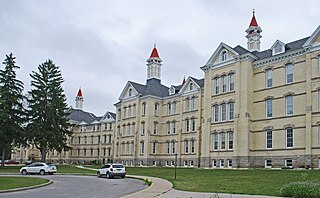
The Traverse City State Hospital of Traverse City, Michigan is a decommissioned psychiatric hospital that has been variously known as the Northern Michigan Asylum and the Traverse City Regional Psychiatric Hospital. It is the last Kirkbride Building of Michigan's original four left in the state. It was listed on the National Register of Historic Places in 1978 and designated a Michigan State Historic Site in 1985.

Crater Lake Superintendent's Residence, is "an impressive structure of massive boulders and heavy-handed woodwork" at Crater Lake National Park in southern Oregon. It was declared a National Historic Landmark in 1987 as an important example of 1930s National Park Service Rustic architecture.
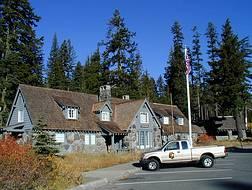
Munson Valley Historic District is the headquarters and main support area for Crater Lake National Park in southern Oregon. The National Park Service chose Munson Valley for the park headquarters because of its central location within the park. Because of the unique rustic architecture of the Munson Valley buildings and the surrounding park landscape, the area was listed as a historic district on the National Register of Historic Places (NRHP) in 1988. The district has eighteen contributing buildings, including the Crater Lake Superintendent's Residence which is a U.S. National Historic Landmark and separately listed on the NRHP. The district's NRHP listing was decreased in area in 1997.

The Winchester Repeating Arms Company Historic District is a historic district in New Haven, Connecticut that was listed on the National Register of Historic Places in 1988. It includes 867 properties, which "include 858 major structures and 131 notable outbuildings." Of these structures, 876 are buildings deemed to contribute to the historical and/or architectural significance of the area, and most of these are residential. However the center of the district is "dominated" by the 75-acre (30 ha) tract of the former Winchester Repeating Arms Company, which contains industrial buildings.
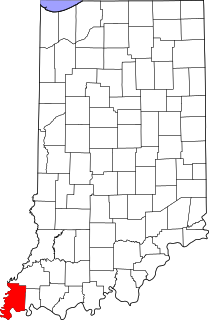
This is a list of the National Register of Historic Places listings in Posey County, Indiana.
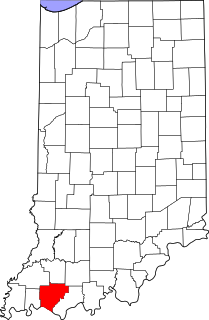
This is a list of the National Register of Historic Places listings in Warrick County, Indiana.

The Stock Center in Cody, Wyoming was built in 1927 as the original home of the Buffalo Bill Museum, serving in that purpose until the museum was relocated to a new complex across the street. The log structure is intended to suggest a stockman's log cabin, rendered on a large scale.
The Campus of Clemson University was originally the site of U.S. Vice President John C. Calhoun's plantation, named Fort Hill. The plantation passed to his daughter, Anna, and son-in-law, Thomas Green Clemson. On Clemson's death in 1888, he willed the land to the state of South Carolina for the creation of a public university.

Munson Hall is a residence hall on the campus of George Washington University, located at 2212 Eye St., Northwest, Washington, D.C. in the Foggy Bottom neighborhood.

Corcoran Hall is an academic building on the campus of George Washington University in Washington, D.C. It was listed on the District of Columbia Inventory of Historic Sites in 1987 and the National Register of Historic Places in 1991.

Stockton Hall is a building on the campus of George Washington University in Washington, D.C.. It was listed on the District of Columbia Inventory of Historic Sites in 1987 and on the National Register of Historic Places in 1991.
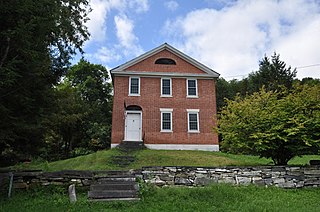
The General Robinson Hall House is a historic house at 3144 United States Route 7 in southern Wallingford, Vermont. Built in 1830, it is the surviving one of two nearly identical brick houses in this area, both built for members of the locally prominent Munson family. The house was listed on the National Register of Historic Places in 1986.

Le Mars Municipal Park and Golf Course Historic District is a nationally recognized historic district located in Le Mars, Iowa, United States. It was listed on the National Register of Historic Places in 2001. At the time of its nomination the district consisted of 25 resources, including 11 contributing buildings, one contributing site, four contributing structures, eight non-contributing buildings, and one non-contributing structure.




















